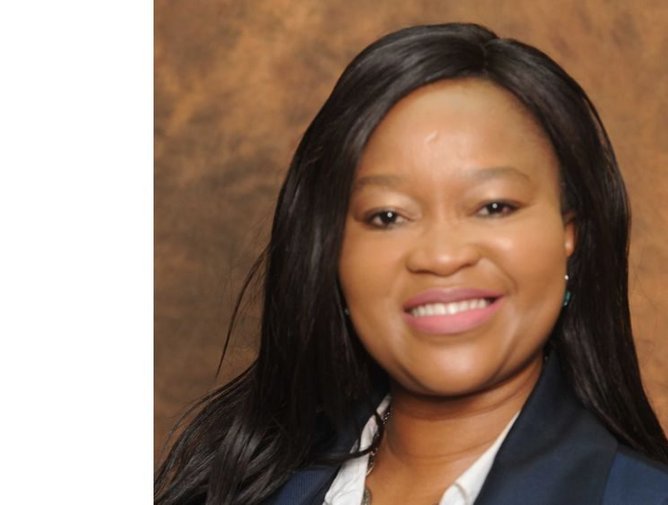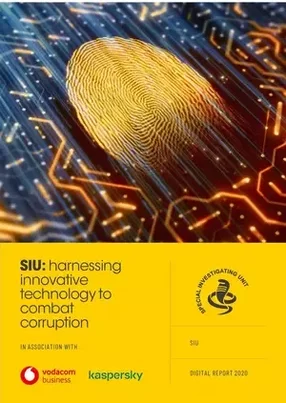SIU: harnessing innovative technology to combat corruption
Joining the Special Investigating Unit (SIU) in 2018, Tumelo Zwane has been the Chief Information Officer for two years.
“The special investigating unit is responsible for investigating acts of corruption, ensuring that public funds are not misused and instill discipline so that everyone is accountable and accounts for how they procure, tender and award contracts, to service providers,” explains Zwane.
“The difference between us and other agencies within the department, we are the only ones that are responsible for recovering the funds that are misused, or misappropriated by government officials. We go as far as instituting litigations and civil proceedings via a special tribunal solely put together to deal with SIU investigations.”
Late last year, Zwane began crafting a digital strategy for the SIU which looked at three pillars to Stabilise, Optimise and Digitise its current environment by upgrading its network.
The Stabilisation phase of the strategy has been done “This stage of the digital strategy we have already done,” comments Zwane, “we have upgraded our network to higher bandwidth, moving to a more stable network and refreshed our end user devices and data centre infrastructure. We have also ensured that we've got some of the necessary tools to conduct faster and better data analytics, cybersecurity and forensic analysis operations. All these different tools will help with our investigations and improve our turnaround times. We have also been looking at how we can ensure business continuity via the right platforms and technology to allow our investigators to work from anywhere at any time - this is the first pillar.” This is achieved through establishing strategic partnerships with IT industry players
SIU’s second digital strategy pillar looks at how both its value chain and current applications can be optimised. “We've been in a process of enhancing our current systems as well as enhancing our tools and the way we do work to ensure that we achieve the results faster and quicker,” says Zwane.
The final pillar focuses on creating a digital business in the near future where SIU can ensure that, wherever possible, operations are as paperless and contactless as possible.
“We aim to achieve this by using technology like artificial intelligence (AI) and robotics to enhance our investigative capabilities,” states Zwane. “Unfortunately, due to the impact of COVID-19, some aspects of our three-year plan have had to have been put on hold, due to the need to meet current demands and situations within the world and the country.”
Currently within its digital strategy, SIU has been looking at multiple technologies to continuously improve its operations.
“As well as AI and robotics, we are also looking at machine learning and Big Data Analytics tools to enhance our current tool sets. For this we are looking at various tools that will suit our business needs and put our business at the cutting edge of technology innovation.,” comments Zwane. She adds that SIU is harnessing AI for authentication purposes and will be looking to adopt Big Data analytics capabilities in the next financial year.
When it comes to security and managing potential threats, Zwane highlights that the SIU’s cybersecurity strategy is designed to ensure that information is stored safely and locally within the country, with plans to move into a private cloud platform.
“You can imagine how critical our data is, so when it comes to securing our data we make use of security tools that ensures that we don’t expose that data,” says Zwane. “We also have multiple firewalls and different channels to pinpoint potential threats, allowing us to mitigate the impact.”
The impact of COVID-19 for the SIU
“COVID-19 brought in the challenges of people having to work from home and ensuring that our data continues to be secure,” comments Zwane. Because of this, SIU has had to equip its members with mobile technology and tools like Microsoft Teams in order to conduct its transitional methods of face-to-face interviews online.
“The challenges that come with this are that not everyone is technologically inclined as the vast majority of our members are investigators and legal specialists. As a result, we had to bring in an element of change management to show that these technologies can be an enabler to make life easier.”
When it comes to the next steps for the industry, Zwane believes that the industry will see a shift in the use of technology and the industry’s reliance on working from home or offsite.
“The future for SIU will be for us to harness big data analytics, AI and robotics to help us conduct investigations quicker and better, leading to a world beyond COVID-19 where corruption will be dealt with quicker and more decisively due to the benefits of technology and digital transformation” says Zwane.
Not only does Zwane see corruption being dealt with quicker and more decisively, she also sees the industry further developing preventative methods with the adoption of technology to detect if there is intention for a corrupt act.
“In the future, we will have risk engines robust enough that they will be able to help us identify potential risks for corruption and give insight to the powers that be,” she says.
Reflecting on the company as a whole, Zwane claims “one of our strengths is the fact that we have a large workforce of people that have extensive training in forensic investigations and strong insight on how to navigate a web of activities that lead into corruption.
“Fortunately for us, because of the powers that we were given, our Proclamations are signed by the President of the country allowing us to be able to deal with matters decisively. From a technological point of view, the strength we have is being able to leverage different technologies that are present throughout the world and try and collaborate with other agencies with a similar role.”


